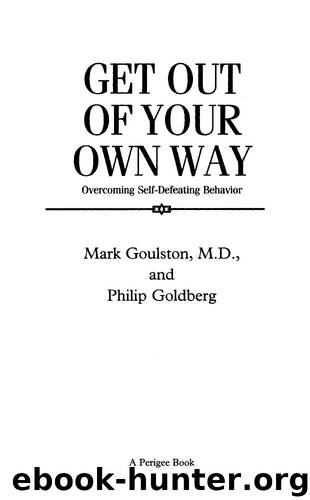Get Out of Your Own Way: Overcoming Self-Defeating Behavior (Perigee) by Goulston Mark & Goldberg Philip

Author:Goulston, Mark & Goldberg, Philip [Goulston, Mark]
Language: eng
Format: epub
ISBN: 9781101657751
Publisher: Penguin Group US
Published: 1996-02-01T00:00:00+00:00
Pretending You’re Fine When You’re Not
“Dare to be true: nothing can need a lie: A fault, which needs it most, grows two thereby.”
—GEORGE HERBERT
John, a 43-year-old hardware store manager, was telling me about an upcoming visit from his parents, who lived out of town. I asked if he was looking forward to seeing them.
“It’ll be fine,” he said.
“You don’t sound very convincing,” I replied.
“Well, they bicker constantly, and criticize everything I do. But they’re in their late seventies, so I guess I’m lucky they’re still alive.”
I pushed John to express what he really felt. He admitted that he couldn’t stand his parents’ visits. “It drains me,” he said. “Nobody enjoys it, not even them.”
John’s typical response was to withdraw into a sullen, pouty silence. His parents would ask, “Is something wrong?” and he would say, “No, no, I’m fine.” In most instances he couldn’t even admit to himself that something was wrong.
This sort of denial is common. Admitting to yourself that you are upset or in pain can make you feel exposed. You fear that acknowledging a bad feeling gives it more power. The pain might get worse. You might not be able to tolerate it. In fact, the opposite is usually true: recognizing a feeling releases pent-up tension and makes you feel better rather than worse.
You might also fear that you won’t be able to say, “I feel bad” without blaming someone. Then you’ll have to either retaliate or, if you blame yourself, feel ashamed. You might even be forced to take action, and that prospect can be frightening: “What if I don’t have the skill or wisdom to make things better?” you wonder. “What if I have to do something risky?” It’s a lot easier to exempt yourself by not admitting you feel bad in the first place.
As I told John, it’s important to realize that being okay doesn’t mean feeling okay all the time. Rather, it means being able to experience appropriate feelings without denial, self-deception or repression. Mentally healthy people feel what they are supposed to feel: when they are angry, they feel anger; when they are sad, they feel sadness. Owning up to the feeling is the first necessary step toward feeling better.
It is also important to realize that acknowledging bad feelings doesn’t mean you have to do anything about them. In fact, telling yourself you feel bad actually diminishes the need to act. It stifles the impulse to take sudden, precipitous action, which could make things worse.
I suggested to John that when his parents started to get to him, he should say to himself, “I hate the way I feel.” He seemed puzzled but agreed to try it. The next time I saw him he said, “As soon as I told myself ‘I hate the way I feel,’ I felt relieved.” He was able to tolerate his parents without pouting or withdrawing—and without blowing up when they continued to annoy him.
Admitting to yourself that you feel bad is, of course, a prerequisite to admitting it to others.
Download
This site does not store any files on its server. We only index and link to content provided by other sites. Please contact the content providers to delete copyright contents if any and email us, we'll remove relevant links or contents immediately.
The Compound Effect by Darren Hardy(8974)
Tools of Titans by Timothy Ferriss(8402)
How to Be a Bawse: A Guide to Conquering Life by Lilly Singh(7489)
Deep Work by Cal Newport(7089)
Wiseguy by Nicholas Pileggi(5791)
Grit by Angela Duckworth(5617)
The Slight Edge by Jeff Olson(5420)
Discipline Equals Freedom by Jocko Willink(5391)
The Motivation Myth by Jeff Haden(5214)
The Laws of Human Nature by Robert Greene(5213)
Influence: The Psychology of Persuasion by Robert B. Cialdini(4798)
Year of Yes by Shonda Rhimes(4760)
The Miracle Morning by Hal Elrod(4732)
The Four Tendencies by Gretchen Rubin(4606)
Eat That Frog! by Brian Tracy(4543)
The Confidence Code by Katty Kay(4265)
Hyperfocus by Chris Bailey(4123)
Visual Intelligence by Amy E. Herman(3787)
The Inner Game of Tennis by W. Timothy Gallwey(3689)
